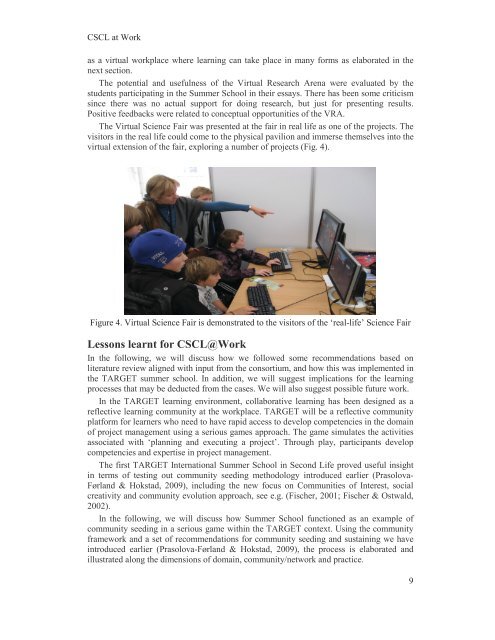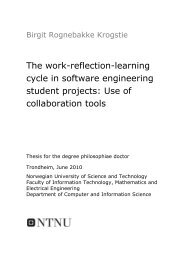Disputation Mikhail Fominykh - Department of Computer and ...
Disputation Mikhail Fominykh - Department of Computer and ...
Disputation Mikhail Fominykh - Department of Computer and ...
You also want an ePaper? Increase the reach of your titles
YUMPU automatically turns print PDFs into web optimized ePapers that Google loves.
CSCL at Work<br />
as a virtual workplace where learning can take place in many forms as elaborated in the<br />
next section.<br />
The potential <strong>and</strong> usefulness <strong>of</strong> the Virtual Research Arena were evaluated by the<br />
students participating in the Summer School in their essays. There has been some criticism<br />
since there was no actual support for doing research, but just for presenting results.<br />
Positive feedbacks were related to conceptual opportunities <strong>of</strong> the VRA.<br />
The Virtual Science Fair was presented at the fair in real life as one <strong>of</strong> the projects. The<br />
visitors in the real life could come to the physical pavilion <strong>and</strong> immerse themselves into the<br />
virtual extension <strong>of</strong> the fair, exploring a number <strong>of</strong> projects (Fig. 4).<br />
Figure 4. Virtual Science Fair is demonstrated to the visitors <strong>of</strong> the ‘real-life’ Science Fair<br />
Lessons learnt for CSCL@Work<br />
In the following, we will discuss how we followed some recommendations based on<br />
literature review aligned with input from the consortium, <strong>and</strong> how this was implemented in<br />
the TARGET summer school. In addition, we will suggest implications for the learning<br />
processes that may be deducted from the cases. We will also suggest possible future work.<br />
In the TARGET learning environment, collaborative learning has been designed as a<br />
reflective learning community at the workplace. TARGET will be a reflective community<br />
platform for learners who need to have rapid access to develop competencies in the domain<br />
<strong>of</strong> project management using a serious games approach. The game simulates the activities<br />
associated with ‘planning <strong>and</strong> executing a project’. Through play, participants develop<br />
competencies <strong>and</strong> expertise in project management.<br />
The first TARGET International Summer School in Second Life proved useful insight<br />
in terms <strong>of</strong> testing out community seeding methodology introduced earlier (Prasolova-<br />
Førl<strong>and</strong> & Hokstad, 2009), including the new focus on Communities <strong>of</strong> Interest, social<br />
creativity <strong>and</strong> community evolution approach, see e.g. (Fischer, 2001; Fischer & Ostwald,<br />
2002).<br />
In the following, we will discuss how Summer School functioned as an example <strong>of</strong><br />
community seeding in a serious game within the TARGET context. Using the community<br />
framework <strong>and</strong> a set <strong>of</strong> recommendations for community seeding <strong>and</strong> sustaining we have<br />
introduced earlier (Prasolova-Førl<strong>and</strong> & Hokstad, 2009), the process is elaborated <strong>and</strong><br />
illustrated along the dimensions <strong>of</strong> domain, community/network <strong>and</strong> practice.<br />
9
















